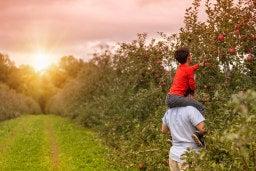农业的机会

农场管理资源
越来越多的生产者认识到 农业和以农业为基础的教育所固有的机会. 他们认为这是一个延长的生长季节, 哪里的游客渴望一个田园度假是成熟的采摘. And while many farm operators started in agritourism as an opportunity to supplement their farm income or to avoid putting all their eggs in one basket, many are using their farms as a form of ‘place-based’ learning that connects visitors to the vital role that agriculture plays in daily life. 最近, 一位农业旅游经营者告诉我的时候说得最好, 同时向游客介绍当地的食物, I see light bulbs go off when they begin to realize the role their decisions as consumers play in the community, 经济, 环境, 甚至体育彩票外围平台的传统.”

农业旅游是将农场作为旅游目的地的一种实践目前的旅游业趋势与农业旅游有着天然的联系. The current pandemic has ushered in a shift in travel preferences; travelers are taking an increased number of shorter family-oriented ‘staycations’ or ‘safe-cations’ within driving distance of home and planning those trips at the last minute. 当机会来临, agritourism operators find they have the perfect ingredients to answer the door and help visitors connect to unique pastoral adventures.
和其他行业一样, agritourism operators’ 经历 throughout the pandemic have not all been the same. Those operators able to pivot to creative marketing and alternate delivery systems have been able to thrive during this period. Others without the space and resources to comply with the pandemic restrictions have had to close for the season or shutter their operations indefinitely. 其他人发现, 在这个赛季,他们努力让自己的头浮出水面, they have discovered more efficient practices that will help improve operations in the long-run, such as online booking with contactless pick-up/delivery; webpage and social media marketing; virtual farm tours, or simple ideas like assigning limited spots for ‘u-pick’ so that the area gets picked more thoroughly.

The 2020 reality as remade by COVID-19 has certainly underscored that as far as small farms go, 创造力, 毅力和韧性是从这场大流行中恢复过来的关键. Agritourism operators must embrace the short-term ‘safe-cations’ phenomenon while looking to retool their operations for the long-haul. 在这方面, some operators are finding success in a new paradigm for how they offer agritourism as a product; one that helps overcome many of the disadvantages they face as individual producers, while simultaneously overcoming the geographical and infrastructure challenges that many rural areas face.
Agritourism operators are increasingly recognizing that agritourism business is ‘shared’ business - the more there is to do and see at a regional destination, 目的地越吸引人. 这将导致更长的访问时间和更多的游客消费. “合作竞争”的双赢模式, with agritourism operators working cooperatively while engaging in friendly competition with their peers and other local small businesses, 可能是长期成功的“热键”吗. By creating a ‘cluster’ concept where individual agritourism operators work synergistically to build on their unique strengths to create unique travel destinations can be a strong ‘magnet’ to pull visitors to a ‘good-value’ destination, 有效地将游客从未计划的农业活动转移到计划好的农业活动.

The ‘co-opetition’ or ‘cluster’ or ‘farm trail’ model lends itself to community planning and coordination to put on high-quality regional events with uniform branding to create or reinforce a regional identify or ‘differentiated locality’. 通过合作工作, operators can also harness the power of synergy to offer year-round adventure and 经历. This allows operators to capitalize on short-term windfalls while also having a long-term strategy to capitalize on the ‘new golden age of travel’. Of course, there is also the added benefit of commiseration and mutual support when working together.
Creative ideas for agritourism activities are unlimited, but agritourism is not for everyone. 在执行新的或扩展的农场冒险之前, 或者决定作为一个农业集群的一部分工作是否适合你, you will need to analyze the fundamental business competencies required to successfully manage the synergy between operating your farm and operating a tourism enterprise on your farm. Be sure to consider the following critical questions before jumping headfirst into any agritourism enterprise:
- 评估你的农业潜力: What 经历 can I offer visitors that will make my operation unique and profitable while meeting customers expectations?
- 位置我所在的地区是否具有吸引人们来到这个地区的必要特征? Does my farm have the necessary resources/characteristics to draw people to this enterprise? 我的个人特点适合这个公司吗?
- 访客的需求和偏好我的目标市场是谁,产品是什么, 经历, 他们追求的是设施和标准?
- 财务可行性我提议的企业在经济上可行吗? 相对于这项投资的成本,潜在的回报是多少? 前期费用是否可观? 我是否有必要的财政资源使其成功? Will I be able to generate enough cash on a regular basis to pay daily operating expenses? 拟建企业对我的整个农场收入有何影响?
- 市场可行性我能以合理的价格交货吗? 我的企业能否吸引足够多的访客,使其盈利?
- 营销策略我希望顾客听到我公司的名字时能想到什么? 我在市场营销方面的独特地位/优势是什么? 我如何让潜在客户知道我在做生意?
- 法律责任:我将从拟议的企业中承担哪些监管和责任风险? 我是否了解如何有效管理这些新风险?
- 酒店接待及访客管理: Do my employees and I have the people skills to deliver a good agritourism product? Do I understand how to manage the visitor experience so they become repeat customers? 我是否愿意倾听和回应访问者的反馈? 我能否轻松调整以适应环境变化?
- 合作伙伴关系: Who else will I work with to create an attractive regional destination that visitors will want to visit? 我的农场能成为一个有价值的区域合作伙伴吗?
还记得, it is important to consider the ‘win-win situation’ when managing your agritourism enterprise – your business goals and your customers’ expectations!
作者:
Doolarie Singh-Knights博士.D.
Associate Professor and Extension Specialist, Agribusiness Economics and Management
西弗吉尼亚大学